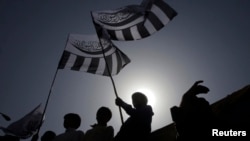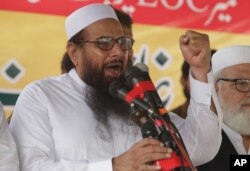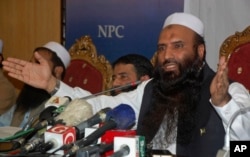A Pakistani Islamist charity, which the United States designated as a "foreign terrorist organization" three years ago, has formed a new political party with a mission to enter mainstream politics and contest future national elections.
The controversial charity, called Jamaat-ud-Dawa (JuD), is believed to be a front for the banned anti-India Lashkar-e-Taiba (LeT) organization and is run by Hafiz Saeed, the alleged mastermind of the 2008 deadly Mumbai attacks.
Washington has offered a $10-million bounty for information leading to the arrest and conviction of Saeed, who has been under house arrest in Pakistan for the last six months.
Islamabad detained the Islamist leader under international pressure and authorities recently extended his detention for another two months.
Speaking to reporters Monday in Islamabad, Saeed's longtime associate, Saifullah Khalid, in his capacity as president of the newly-formed Milli Muslim League party, explained its mission.
"We have decided to make a new political party, so that Pakistan is made an Islamic and welfare state in the true sense of the word, and also, so that we can find a better solution to the issues faced by our beloved country," Khalid said.
Humanitarian charity
JuD denies it is a front for LeT and calls itself a humanitarian charity. It also denies involvement in the Mumbai carnage that left at least 166 people dead and brought India and Pakistan to the brink of another war.
Khalid said a request has been submitted with Pakistan's election commission to register the party to participate in future elections.
He went on to say that JuD will continue its welfare activities across Pakistan, and the political party will strive to be a "permanent and sovereign" party at the national level.
Khalid promised his party will maintain coordination and cooperation with JuD and other organizations involved in welfare activities.
"God willing, from the platform of the Milli Muslim League, we will continue this work countrywide, right down to the Union Council level," vowed the leader.
Khalid demanded Pakistani authorities immediately release Saeed, and criticized the decision to extend in his detention.
"First of all, Professor Hafiz Mohammad Saeed should be honorably released. There are no charges against him. He has always been found not guilty by the courts. He has been put under house arrest on charges of being innocent," asserted Khalid.
He did not rule out a role for Saeed in the newly-launched political party once he is freed.
Terrorist designation
There was no immediate reaction from U.S or Indian officials to Monday's announcement by the JuD leaders.
Michael Kugelman, a South Asia analyst at Woodrow Wilson Center in Washington, said Saeed’s move indicates his hope to soften an image that for many in Pakistan is already quite positive.
“He likely wants to gain legitimacy for his views and ideas by being seen as a political figure, working from within the system, and not merely as a militant leader dabbling in charitable work,” Kugelman noted.
He said it is “highly unlikely Hafiz Saeed will sever ties” with militant groups that have helped sustain his popularity in recent years.
Pakistan has long been accused of harboring militant groups involved in terrorist attacks in India and Afghanistan.
Islamabad rejects the charges and, in turn, blames New Delhi for sponsoring terrorist attacks on Pakistan soil to destabilize the country.
The United States designated LeT as a foreign terrorist organization (FTO) in December 2001.
"Shortly after LeT was designated as an FTO, Saeed changed its name to Jamaat-ud-Dawa (JUD) and began humanitarian projects to circumvent restriction. LeT disseminates its message through JUD's media outlets," according to information posted on the State Department website.
The department's country report on terrorism for 2016 said the LeT and its wings continued to make use of economic resources and raise funds in Pakistan.






